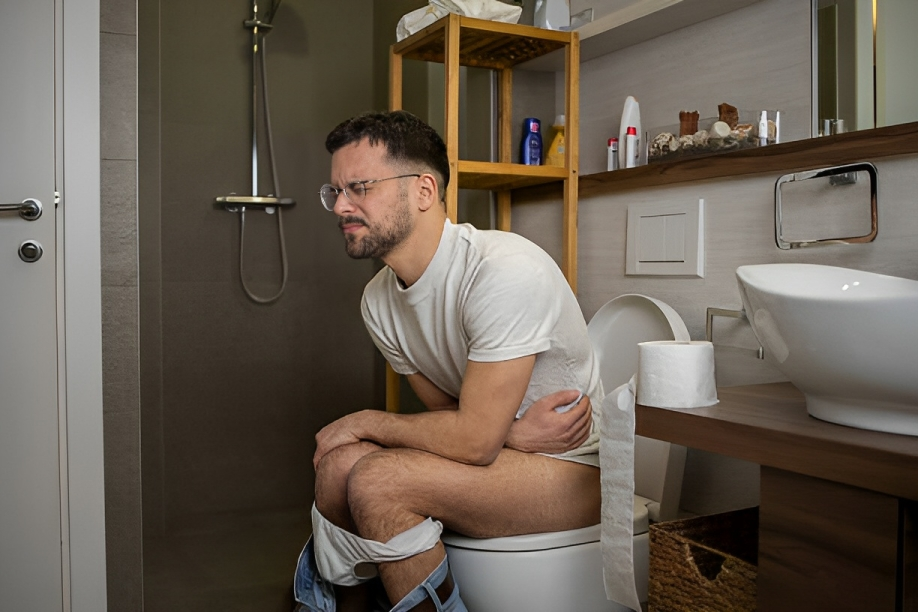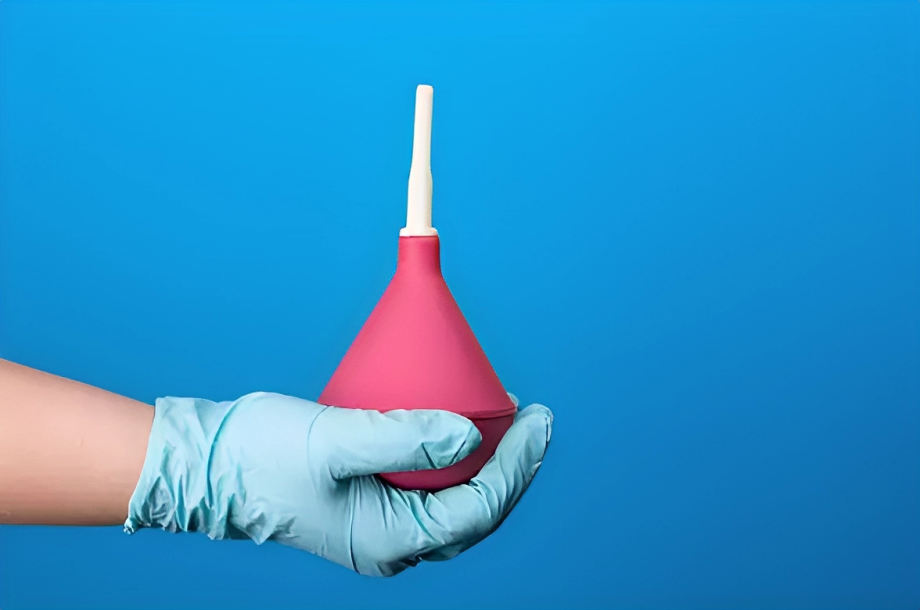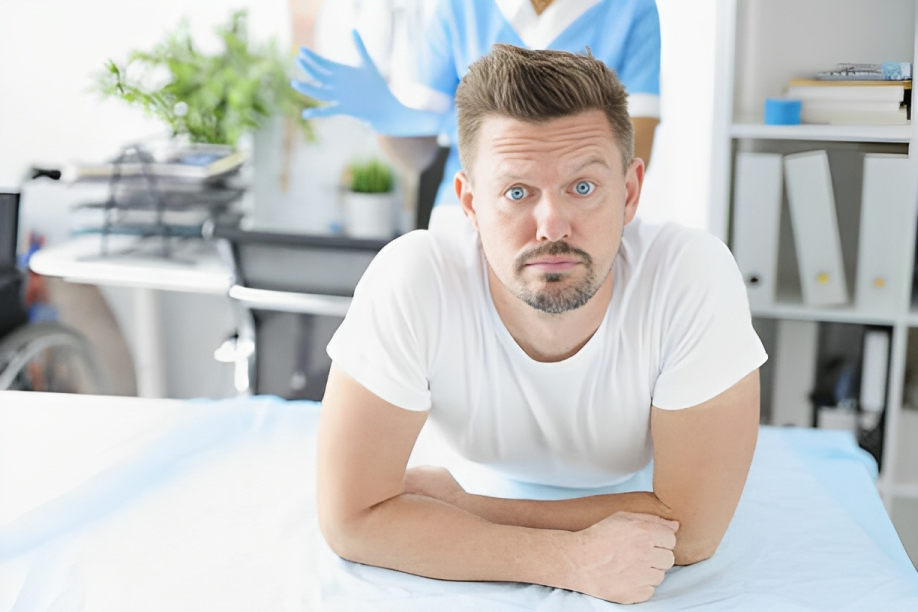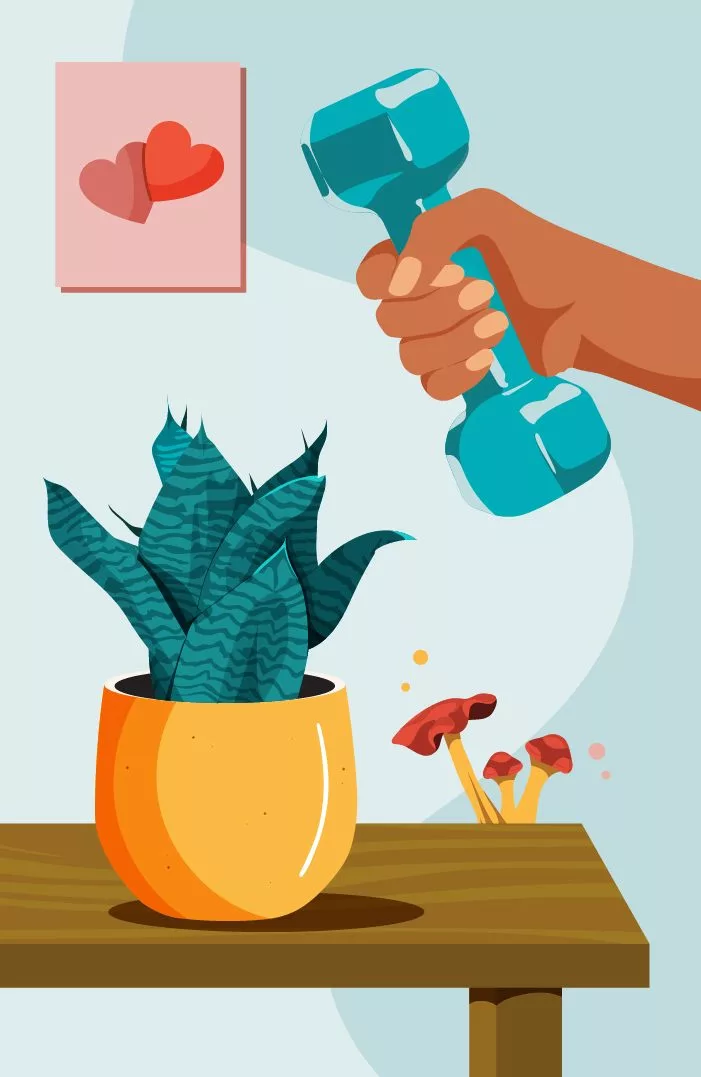Fecal impaction is an intestinal disorder in which your fecal matter (waste material) is stuck into the colon and rectum, and you can not evacuate it from your body despite regular bowel activity.
Defecation is a routine activity which involves the evacuation or removal of waste material from your body through the anus. Fecal impaction affects your normal defecation activity, resulting in the retention of fecal matter in the colon and rectum that becomes dry and hard with time.
Chronic constipation is the most common cause of fecal impaction, which affects 70% of the elderly population. It usually targets the older population due to decreased mobility and neuropsychiatric disorders.
Fecal impaction is a common problem nowadays and remains neglected due to limited knowledge exposure. It should be diagnosed and treated early to avoid serious complications.1Setya, A. (2023, July 4). Fecal impaction. StatPearls – NCBI Bookshelf. https://www.ncbi.nlm.nih.gov/books/NBK448094/
Causes & Risk Factors of Fecal Impaction
Fecal impaction is a multifactorial disease caused by changes in your daily lifestyle and other associated diseases that affect your normal bowel activity. Constipation remains the most common cause of fecal impaction. The causes and risk factors for constipation are:
Lifestyle Risk Factors for Fecal Impaction:
Your daily lifestyle activities may contribute to your bowel habits. Some lifestyle risk factors make you prone to having fecal impaction. These are2Creason, N., & Sparks, D. (2000). Fecal impaction: a review. Nursing diagnosis: ND: the official journal of the North American Nursing Diagnosis Association, 11(1), 15–23. https://doi.org/10.1111/j.1744-618x.2000.tb00381.x
Low Fiber Diet Intake
A high-fiber diet makes your stool soft. Therefore, a low-fiber diet forms hard stool that remains impacted in the colon and rectum.
Dehydration
Dehydration is the most common cause of constipation. When dehydrated, your body conserves more water, making your stool dry and harder. Hard still is difficult to evacuate from the anus, which results in constipation.
Pelvic Floor Abnormality
Pelvic floor muscles help you push the fecal matter during dedication. Abnormality of pelvic muscles results in constipation.
Laxative Abuse
Laxatives are the drugs that are used to cure constipation. Laxative abuse makes you dehydrated and also affects the neurovascular bundle of the gut, resulting in constipation.
Opioids
Opioids are drugs that are used to relieve pain medications and make you feel sleepy. These drugs decrease the motility of your gut, resulting in stasis of the fecal matter in the intestine for a long time. Due to stasis, more water is absorbed from the stool, and hard stool formation causes constipation.
Anticholinergics
Anticholinergic medications (medications that inhibit acetylcholine activity, like calcium channel blockers and antiemetics) affect the nerves of your intestine and decrease its motility, resulting in constipation.
Stress
Stress can cause constipation because, in stress, your body is in a defensive mode and releases adrenaline. This hormone makes your gut hypoactive by limiting its blood supply.
Holding it in
Holding stool for a long time due to the unavailability of washrooms or due to loss of sense of defecation can also cause constipation because it gives time for the intestine to absorb more fluid from it and make it dry hard.
Medical Illness Causing Constipation:
Some medical diseases can cause bowel obstruction and constipation. These include the following:
Diabetes
Diabetes is the most common medical illness present in every clinical setup nowadays. It affects the neurovascular bundle of your gut and obstructs the normal defecation process.
Irritable Bowel Syndrome
On-and-off constipation is a clinical feature of irritable bowel syndrome. The etiology of IBS is not well understood.
Bowel Obstruction
Bowel obstruction is the most common intestinal disorder that affects your bowel movement, resulting in constipation.
Post-Surgical
Constipation or intestinal obstruction is the most common post-surgical complication. After surgery, your gut can be damaged, or adhesions are formed that can cause obstruction, leading to constipation.
Hypothyroidism
Thyroid is a hormone that affects your metabolism. Hypothyroidism slows down your gut motility, resulting in stasis of the fecal matter that causes constipation.
Neurological Disorders
Various neurological diseases (Alzheimer’s disease and Parkinson’s) affect the nerve fibers of the intestine and affect its normal bowel movement, causing constipation.3Bolen, B., Ph.D. (2022, November 8). What is fecal impaction? Verywell Health. https://www.verywellhealth.com/what-is-fecal-impaction-1945043
Symptoms of Fecal Impaction
The symptoms of fecal impaction vary according to the condition of the patient. Some patients may have mild to moderate symptoms, while others have severe. However, the most common symptoms of fecal impaction are4Derrow, P. (2022, October 25). What is fecal impaction? Symptoms, causes, diagnosis, treatment, and prevention. EverydayHealth.com. https://www.everydayhealth.com/fecal-impaction/#causes
- Persistent lower abdominal pain
- Abdominal discomfort
- Bloating
- Distended abdomen
- Fecal soiling
- Decrease in appetite
- Backache
- Nausea and vomiting
- Headache
- Leaking of stool
- Passing stone-like stools
- Urinary tract infection
- Continuous urge to pass stools
- Feeling pressure on the bladder

When to see your Doctor?
Whenever you feel constipation for a longer period (more than two weeks) of time and have a distended abdomen, immediately book your appointment with your doctor for your evaluation.
How to Diagnose Fecal Impaction?
Usually, the diagnosis of fecal impaction is history and clinical-based, but laboratory and imaging techniques also help determine the cause of the disease. This diagnostic work-up of fecal impaction includes the following steps:
History
History will help your doctor reach a diagnosis. Your doctor may ask some questions related to constipation.
- Name and age of the patient
- How long have you had constipation?
- Do you feel pain in your abdomen?
- Do you feel distension in your abdomen?
- What is your daily fluid intake?
- Is your appetite good or not?
- Do you feel the urge to pass your stools?
Physical Examination
After taking the history, your doctor may do a physical examination. During physical examination, he will palate your abdomen to check distension and tenderness. After palpation, he will auscultate your abdomen with the help of a stethoscope to check the bowel sounds.
Digital Rectal Examination (DRE)
It is a physical procedure in which your doctor puts sterilized gloves on his hand and applies a lubricant (analgesic) on his finger. After that, he will put his finger into your rectum to check for hard stool, rectal mucosa, or diverticula.
Laboratory Investigations
Laboratory investigations are advised to rule out other diseases. These investigations include:
- Complete blood to check for anemia
- White blood cell count to check for any acute or chronic illness
- Electrolyte studies are important to check your body’s hydration status
- Stool examination
- Urine examination
Imaging Studies
Imaging studies are used to confirm the diagnosis. These studies include:
X-ray Abdomen Erect:
X-ray of the abdomen in an erect position may help to see any obstruction or perforation. Stools build-up appears on X-ray in fecal impaction.
Sigmoidoscopy:
Sigmoidoscopy is a minimally invasive procedure in which a sigmoidoscope is passed through the rectum to see the internal structure of your anal canal.
CT Abdomen
CT abdomen is rarely advised in case of constipation, but in serious cases, it is advised to rule out the other causes of the disease. 5IDdigital. (2020, February 27). Fecal impaction: causes, symptoms, and treatments – gastroenterology Consultants of Savannah. Gastroenterology Consultants of Savannah. https://www.gastrosav.com/blog/fecal-impaction-causes-symptoms-and-treatments/
How to Treat Fecal Impaction?
The main aim of treatment is to remove the impacted stool in the intestine. Then, other measures are taken to prevent stool impaction. The treatment options are:
Enema
Enema is the first-line therapy to treat impacted stools. In this procedure, you use a bottle with an attached nozzle. This bottle contains lubricant that softens your hard-impacted stool. Your doctor or helper passes the nozzle into the rectum, squeezes the bottle, and releases lubricant into the rectum, which softens the stool and helps the stool move out easily.

Manual Removal of Impacted Stools
This procedure is suitable when the enema doesn’t work due to the presence of large and hard stools. In the process, your doctor puts his finger inside your rectum and breaks the fecal matter to remove the blockage. Moreover, your doctor can also use suction devices to remove hard stools.
Laxatives
Laxatives are the medicines that are used to treat constipation. This medicine makes your stools soft and increases your bowel activity to push your poop outside your body. Therefore, the recommended dose, according to the doctor’s advice, should be used because laxative abuse can lead to severe constipation.
Suppositories
Suppositories are the melting agents. These are placed in your anus to melt, lubricate and soften the hard poop.
Water Irrigation
In this procedure, your doctor inserts water into your anal canal or rectum to soften your hard stool and helps the stool to evacuate.6Cadman, B. (2023, February 15). How do you treat a fecal impaction?https://www.medicalnewstoday.com/articles/322150#prevention
Home Remedies for Fecal Impaction
If you can’t visit a hospital or choose to avoid medications, your dietary habits play a major role. You can follow some home remedies to help with fecal impaction and prevent constipation. These are the following:
Drink Plenty of Water
Dehydration is the most common cause of constipation. When you are dehydrated, your body conserves more water. It results in concentrated, dry, and hard stool formation. Therefore, drinking more water can help relieve your constipation. However, drinking 4-5 liters of water daily is essential for every individual.
Increase Intake of High Fiber Diet
A high-fiber diet improves the movement of your intestines and increases the bulk of your stool. Therefore, your doctor will advise you to eat a fiber diet to avoid constipation. According to a review study in 2016, it was noted that about 77% of people suffering from chronic constipation benefited from a high-fiber diet. There are two types of dietary fiber: soluble and insoluble.
Soluble Dietary Fibers:
Soluble dietary fibers are those diets that your body can not digest. They absorb more water from the body to make stool soft and easy to pass. These are nuts, lentils, barley, peas and beans.
Non-fermented soluble fibers include psyllium, which remains the treatment of choice to relieve constipation.
Insoluble Dietary Fibers:
Insoluble dietary fibers are those that your body can not digest and add to your waste. They form the bulk of your stool. These include wheat, vegetables, and whole grains.
Regular Healthy Exercise
Healthy exercise also helps to relieve your constipation. Because a sedentary lifestyle increases your risk of having constipation. Healthy exercise makes your pelvic floor muscles stronger and helps during dedication. Moreover, exercise also helps increase your drinking. But vigorous exercise can worsen your condition.
Herbal Laxatives (Sena)
Sena is the most powerful herbal prokinetic that stimulates your gut and nervous system and boosts your gut motility. Consultation with your doctor before taking Sena is necessary. Sena is safe for adults and is not used in pregnancy, breastfeeding, and inflammatory bowel disease.
Low FODMAP Diet
Irritable bowel syndrome can be the cause of constipation. Therefore, your doctor may recommend a low FODMAP diet that helps to relieve constipation. FODMAP (fermentable oligosaccharides, disaccharides, monosaccharides, and polyols) are sugars that your intestine absorbs poorly. They can relieve constipation.
Probiotics
Probiotics are the naturally benefiting bacteria that habitat your gut. Constipation can occur due to an imbalance of probiotics in your gut. Therefore, probiotics can help treat constipation. Probiotic foods are kimchi and yogurt.
Laxatives
Laxatives are used to relieve constipation. The action of laxatives depends upon the type of laxatives. These are:
Osmotic Laxative:
This type of laxative makes your stool soft and easy to move by drawing water from the body to the intestine. It includes milk of magnesia, lactulose, and polyethylene glycol.
Stimulant Laxative:
These laxatives improve the contractility of the intestine and help your fecal matter to move. These are bisacodyl and sennosides.7Hussain ZH, Whitehead DA, Lacy BE. Fecal impaction. Curr Gastroenterol Rep. 2014;16(9):404. doi:10.1007/s11894-014-0404-2
Drink Coffee (Caffeinated)
Drinking coffee containing caffeine helps intestinal muscles contract more efficiently and helps relieve constipation. It also boosts your colon contractions and gastrocolic reflex.
What are the Complications of Fecal Impaction?
Fecal impaction should be diagnosed early and treated to avoid complications. Because stasis of fecal matter for a long duration can be toxic to your body. The most common complications regarding fecal impaction are:
- Peritonitis (inflammation of the peritoneal wall)
- Intestinal obstruction
- Colon ulcer
- Intestinal perforation due to hard stool causes spillage of intestinal content into the peritoneum.
- Blood from stools
- Anal fissure due to hard stools
- Hemorrhoids
- Fecal incontinence
- Urinary tract infection
How to prevent fecal impaction?
You can prevent fecal impaction by adopting the following preventive measures:8Serrano Falcón, B., Barceló López, M., Mateos Muñoz, B., Álvarez Sánchez, A., & Rey, E. (2016). Fecal impaction: a systematic review of its medical complications. BMC geriatrics, 16, 4. https://doi.org/10.1186/s12877-015-0162-5
- Avoid eating fatty food
- Avoid taking processed foods
- Don’t hold the stool for long periods
- Avoid being dehydrated
- Stop smoking
- Improve your sleep pattern

What is the difference between fecal impaction and constipation?
Constipation is when you have infrequent bowel movements, usually less than three stools per week. Constipation results when it’s difficult to defecate. In comparison, fecal impaction is followed by chronic constipation, in which your poops add up to form a hard lump and obstruct the fecal outflow.
Conclusion
To conclude, fecal impaction is a condition when you fail to defecate, and stool gets stuck in your intestines. You may feel abdominal pain, bloating, nausea, vomiting, and a feeling of stone-like stool. Its treatment includes manual removal, enema, laxatives, and suppositories. However, you can prevent fecal impaction by drinking adequate water, using a diet rich in dietary fibers, and taking laxatives.
Refrences
- 1Setya, A. (2023, July 4). Fecal impaction. StatPearls – NCBI Bookshelf. https://www.ncbi.nlm.nih.gov/books/NBK448094/
- 2Creason, N., & Sparks, D. (2000). Fecal impaction: a review. Nursing diagnosis: ND: the official journal of the North American Nursing Diagnosis Association, 11(1), 15–23. https://doi.org/10.1111/j.1744-618x.2000.tb00381.x
- 3Bolen, B., Ph.D. (2022, November 8). What is fecal impaction? Verywell Health. https://www.verywellhealth.com/what-is-fecal-impaction-1945043
- 4Derrow, P. (2022, October 25). What is fecal impaction? Symptoms, causes, diagnosis, treatment, and prevention. EverydayHealth.com. https://www.everydayhealth.com/fecal-impaction/#causes
- 5IDdigital. (2020, February 27). Fecal impaction: causes, symptoms, and treatments – gastroenterology Consultants of Savannah. Gastroenterology Consultants of Savannah. https://www.gastrosav.com/blog/fecal-impaction-causes-symptoms-and-treatments/
- 6Cadman, B. (2023, February 15). How do you treat a fecal impaction?https://www.medicalnewstoday.com/articles/322150#prevention
- 7Hussain ZH, Whitehead DA, Lacy BE. Fecal impaction. Curr Gastroenterol Rep. 2014;16(9):404. doi:10.1007/s11894-014-0404-2
- 8Serrano Falcón, B., Barceló López, M., Mateos Muñoz, B., Álvarez Sánchez, A., & Rey, E. (2016). Fecal impaction: a systematic review of its medical complications. BMC geriatrics, 16, 4. https://doi.org/10.1186/s12877-015-0162-5

